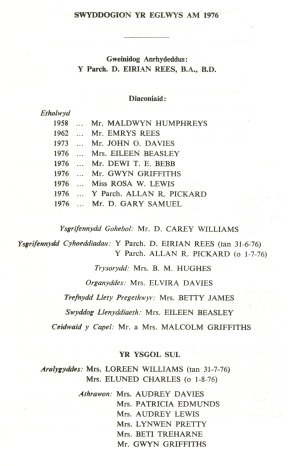 A picture of the situation in Tabernacl during the early 1970's is provided by Penri Jones, who was Secretary of the Chapel from 1971 to 1975. He wrote about Tabernacl in his book 'Capeli Cymru'.
A picture of the situation in Tabernacl during the early 1970's is provided by Penri Jones, who was Secretary of the Chapel from 1971 to 1975. He wrote about Tabernacl in his book 'Capeli Cymru'.
"At the end of the 1960's the membership was 40 and those were mainly pensioners. But a few new families arrived and held campaigns from house to house ... new people came, when they saw how few were in the services most never came back, but slowly there was a change taking place."
At the start of the 1970's the Sunday School was in English but with the increase in demand for Welsh language education it was obvious that there was a need for a Welsh Sunday School also. This brought a revolution to the life of the chapel with membership of the Sunday School reaching 80.
Teulu Twm was formed for the young people.
Chapel membership increased from 78 in 1974 to 143 in 1978.
PENRI JONES
(from Capeli Cymru, Gwasg y Lolfa, 1983)  I remember well moving from Cardiff to Ton-teg in 1968 and after hearing an English sermon in one or two allegedly Welsh chapels in the area, venturing inside Tabernacl one Sunday morning. I did not know the name of the chapel, its denomination, or the language of its services. Upon asking a woman in the lobby it was explained to be in the sonorous dialect of Cwm Tâf: “Cwmra’g yw popeth yma hyd yn hyn.” “Everything is in Welsh here so far.”
I remember well moving from Cardiff to Ton-teg in 1968 and after hearing an English sermon in one or two allegedly Welsh chapels in the area, venturing inside Tabernacl one Sunday morning. I did not know the name of the chapel, its denomination, or the language of its services. Upon asking a woman in the lobby it was explained to be in the sonorous dialect of Cwm Tâf: “Cwmra’g yw popeth yma hyd yn hyn.” “Everything is in Welsh here so far.”
It was a miracle to find a community of people living a few miles outside Cardiff speaking Welsh naturally in the native dialect. Anti Fei, or Elvira Davies, reigned supreme, and had been accompanying and promoting music amongst the children of Tabernacl for generations. At the end of the sixties the membership was 40, and mostly pensioners. They were the last generation of native Welsh speakers in the village. English was by now the language of the Sunday School although there were some Welsh speakers from the Welsh medium school there. Most of the members were disheartened about the future and a church meeting was held to consider holding the services in English, but the voting was almost unanimously against this.
A small number of new families enrolled in the chapel and a Welsh Sunday School began on Sunday mornings. The constant flow of Welsh-speaking families to the neighbourhood and the perpetual growth of the Welsh medium school presented a magnificent opportunity to invigorate the chapel. A promotional pamphlet was prepared and members canvassed the neighbourhood, inviting people to attend. The Reverend Eirian Rees had settled in the village and he was elected minister. Some who attended the services were immediately disillusioned by the small congregation of about a dozen on a Sunday evening, but others stayed and gradually it became apparent that the chapel was prospering.






